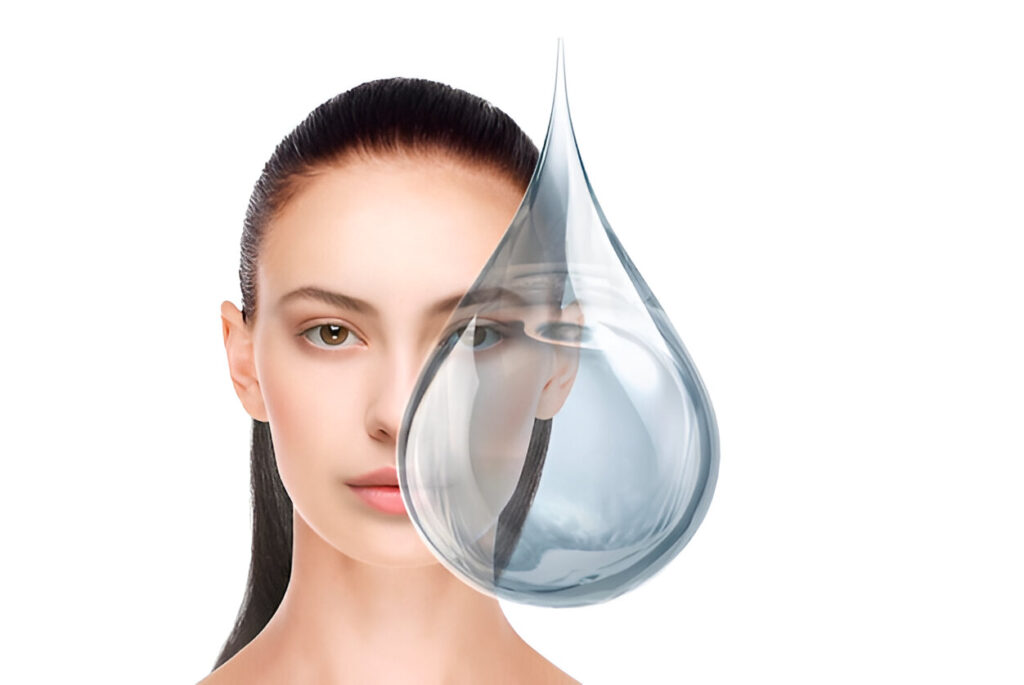Discover how to hydrate skin effectively with proven tips, expert ingredients, and daily habits for lasting moisture and glowing skin.

Skin hydration is more than just a discussion – It’s an important skincare routine. If your skin often feels dry, tight, flaky or dull, you can deal with dehydration. Whether you have dry, oily, or combination skin, learning to effectively hydrate the skin, can help restore its brightness, improve elasticity, and prevent signs of aging.
In this guide, we dive into practical, science -backed tips to deeply hydrate your skin and maintain moisture from both inside and outside.
Understanding Skin Hydration vs. Skin Moisture
Many people confuse hydration and moisturization, but they serve various purposes. Hydration is to increase your skin water content, while moisturization helps in that hydration seal.
If your skin feels rough, dull, or tight, it is possibly dehydrated. On the other hand, if it sounds dry and flaky, you may need more moisture.
1. Start with a Hydrating Cleanser
Your skincare routine starts with cleanliness. But using hard, sulfate-rich face washes can remove the natural oils of your skin. Choose a soft, hydrating cleanser that does not disrupt the moisture balance of your skin.
Look for:
- Glycerin
- Aloe vera
- Coconut-derived surfactants
- Panthenol (Vitamin B5)
2. Apply Products on Damp Skin
Want to do your skincare better? Apply it while your skin is still slightly moist. When you apply hydrating serum and moisturizer after washing your face, your skin absorbs active ingredients more effectively.
This method also reduces Transepidermal water loss (TWEL), which helps your skin to maintain moisture.
3. Use Serums Rich in Humectants
Hydrating serum contains humectants, materials that draw water in the skin. The most effective ones include:
- Hyaluronic Acid – attracts and holds moisture up to 1000x its weight in water.
- Glycerin – draws moisture from the air and deeper skin layers.
- Sodium PCA – a natural component of the skin that hydrates and softens.
Pro tip: Pair hyaluronic acid with a good moisturizer to lock in the hydration it attracts.
4. Moisturize with Hydration-Locking Ingredients
After hydrating, seal it in with a rich but non-comedogenic moisturizer. Choose products based on your skin type:
Dry skin: Ceramides, shea butter, squalane
Oily skin: Gel-based moisturizers with aloe or panthenol
Sensitive skin: Fragrance-free creams with oat extract or niacinamide
Applying moisturizer twice a day strengthens your skin’s lipid barrier and prevents water loss.
5. Drink More Water — But Not Just That
Yes, drinking water is important. But only drinking water is not enough to instantly hydrate your skin unless your entire body is hydrated. Intake water with water rich fruits and vegetables like:
- Cucumber
- Watermelon
- Oranges
- Strawberries
- Spinach
Also, avoid dehydrating drinks like alcohol and caffeinated beverages if your skin feels tight or flaky.
6. Add a Humidifier to Your Routine
Environmental factors play a major role in skin hydration. Dry indoor air, especially air conditioner and heater, can calm your skin moisture. Running a humidifier at night replenishes the moisture in the air, which helps your skin to stay hydrated while sleeping.
7. Don't Skip Your Nighttime Routine
Night time occurs when your skin goes into repair mode. A consistent evening routine supports deep hydration:
- Gentle cleanser
- Hydrating toner or essence
- Hyaluronic acid or niacinamide serum
- Moisturizer or overnight hydrating mask
You can also use occlusive agents like petroleum jelly (slugging) at night to trap hydration and reduce water loss.
8. Avoid Over-Exfoliating or Using Harsh Ingredients
Exfoliation is essential for skin renewal, but overdoing. It can damage your skin barrier, leading to lack of moisture. Limit exfoliating 1-2 times a week using light AHA or BHA.
Avoid ingredients causing excessive dryness:
- Alcohol Denat.
- Strong retinoids (without moisturizer layering)
- Benzoyl peroxide (without hydration support)
9. Protect Skin with SPF Daily
The sun exposure dehydrates the skin and weakens its ability to maintain moisture. Always use a broad-spectrum sunscreen with SPF 30 or higher. See for double sunscreen moisturizing in the form of skincare.
10. Consider Professional Hydration Treatments
If your skin is extremely dehydrated or you’re not seeing improvement from your skincare routine, professional dermatological treatments may help:
- HydraFacial – deep cleans, exfoliates, and hydrates in one session
- Mesotherapy – injects hyaluronic acid directly into the skin
- Skin boosters – improve hydration and texture with long-lasting results
Book a consultation with Dr. Hanan Dermatology Speciality Clinic to explore personalized hydration treatments tailored to your skin type.
Conclusion: Consistency is the Key to Skin Hydration
Understanding how to hydrate skin is about building a daily habit — not just applying a product when your skin feels dry. Hydration works best when combined: internal nourishment, topical hydration, and environmental care.
Keep your routine simple, stay consistent, and protect your skin’s barrier. With time, you’ll notice smoother, brighter, and more resilient skin.
Book Your Consultation Today!
For Personalised Treatment visit Dr. Hanan Clinic. Feel confident and proud with our expert care.

